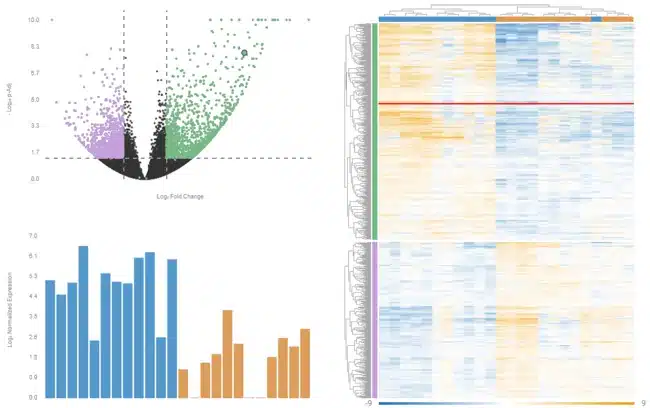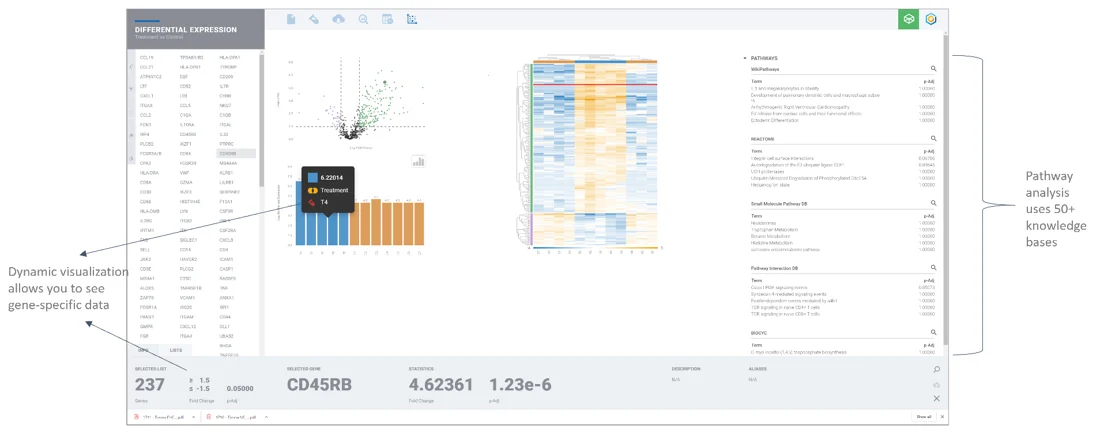How To Use ROSALIND To Showcase Your Discoveries: A Canopy Biosciences Immuno-Oncology Case Study


Advancements in cancer immunotherapy are at an exciting new forefront of successful treatments for metastatic cancer. Particular focus has been given to chimeric antigen receptor (CAR) T-cell therapy, in which a patient's T-cells are genetically engineered to express a synthetic receptor that binds to a tumor antigen. These modified T-cells are then enhanced for clinical use and infused back into the patient's body to attack and destroy chemotherapy-resistant cancer. While largely successful in some of the most difficult to treat cases of leukemia, this form of treatment does come with its challenges.

We’ve seen that as tumors progress, T-cells can become dysfunctional, eventually becoming “exhausted”. The reinvigoration of naturally-occurring and CAR T-cells has now become a focus of recent immuno-oncology research. Scientists at Stanford University have concluded that “a functional deficiency in c-Jun mediates [the] dysfunction in exhausted human T-cells, and that by engineering CAR T-cells to overexpress c-Jun renders them exhaustion-resistant.” Their findings, which are summarized in Nature, address this important major bottleneck for emerging immunotherapies.

Leading cancer researchers are also increasingly adopting multi-omic approaches to gain a deeper understanding of immuno-oncological processes, and are seeking to elucidate the transcriptomic and epigenetic changes during various stages of carcinogenesis, tumor progression, and treatments like the one mentioned above. Yet, the complexity of these assays and the associated data analysis often slows progress for oncology researchers.
Canopy Biosciences offers support with a comprehensive portfolio of services for transcriptome and epigenetic research, including NanoString and RNA-Seq services, and has partnered with OnRamp Bioinformatics to enable clients with the ROSALIND™ platform.
Demonstrating the potential insights from these multi-omic approaches, Canopy has launched an Immuno-Oncology Showcase featuring several leading datasets from published research. ROSALIND Showcases help provide researchers a way to collaborate in real-time with a new experience for summarizing highlights, capturing key observations, and engaging audiences through vivid imagery. Showcases streamline access to insights with a sharing URL and the ability to make any Showcase summary publicly accessible.

The platform also solves the complexity of research through visually interactive data analysis and by offering other forms of online collaboration. ROSALIND enables customers to view differential gene expression data in an intuitive interface, instantly provides publication-ready figures and pathway analysis, and allows for real-time exploration of this shared data with anyone across the globe. Canopy’s expertise in running these assays and interpreting complex data, combined with ROSALIND’s discovery platform, provides customers a rapid decision-empowering data solution for immuno-oncology research.
Learn more about immuno-oncology by accessing our new Showcase, or check out our 15-minute webinar for more information on the ROSALIND platform and interactive analysis.